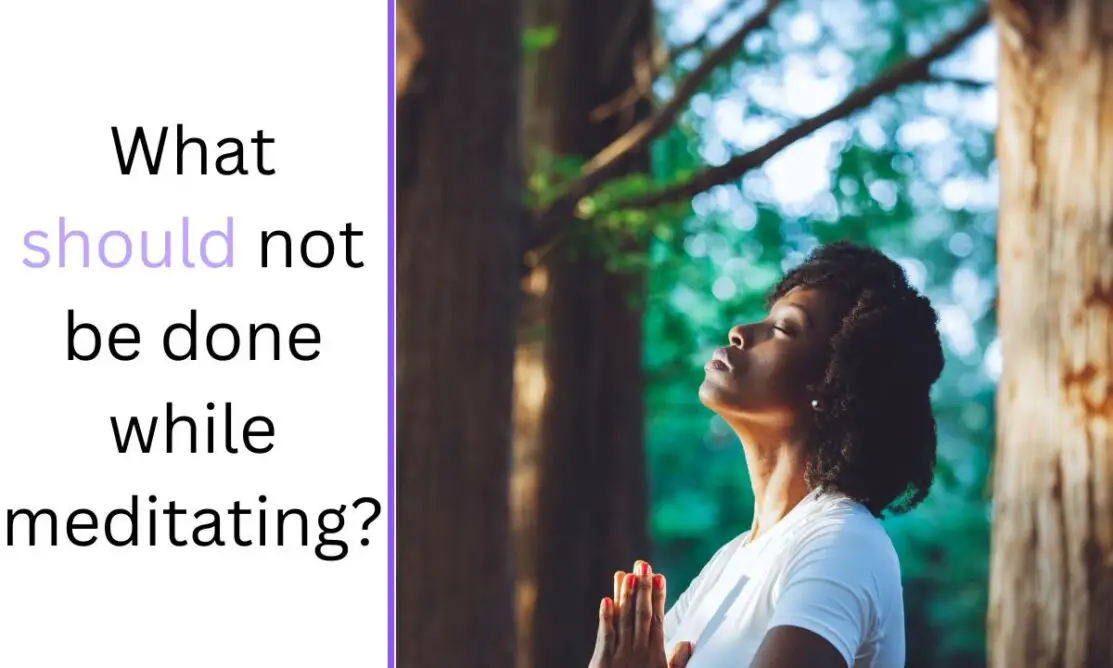Meditation is a powerful tool for calming the mind and body and can be used to reduce stress, improve focus, and cultivate inner peace. However, there are certain things that should not be done while meditating in order to ensure that the practice is effective and beneficial. In this article, we will discuss some of the common mistakes that people make while meditating and how to avoid them.
Don’t Focus on the Outcome: Meditation is about the journey
Are you feeling overwhelmed by the pressure to achieve a certain outcome? Do you find yourself constantly worrying about the end result? If so, it might be time to take a step back and focus on the journey instead.
Meditation is a great way to do just that. It helps you to be present at the moment and to appreciate the process of getting to your goal. Instead of worrying about the outcome, you can focus on the journey and the small steps you take along the way.
When you meditate, you can take a few moments to reflect on your progress and to be grateful for the journey. You can also use it as an opportunity to practice self-compassion and to remind yourself that it’s okay to make mistakes.
Meditation can also help you to stay focused and to stay motivated. It can help you to stay on track and to keep your eyes on the prize. It can also help you to stay in the present moment and to appreciate the journey.
So, if you’re feeling overwhelmed by the pressure to achieve a certain outcome, take a step back and focus on the journey instead. Meditation can help you to stay focused and to appreciate the process of getting to your goal.

Don’t Rush Through Your Practice: Take your time and enjoy the process.
Are you someone who rushes through their practice? If so, you’re not alone! Many of us have a tendency to rush through our practice sessions, trying to get it done as quickly as possible. But this isn’t the best approach. Taking your time and enjoying the process is the key to getting the most out of your practice.
When you rush through your practice, you’re not giving yourself the opportunity to really focus on what you’re doing. You’re not taking the time to really absorb the material and understand it. Instead, you’re just going through the motions, not really taking anything in. This can lead to frustration and a feeling of not making any progress.
On the other hand, when you take your time and enjoy the process, you’re giving yourself the opportunity to really focus on what you’re doing. You’re taking the time to really absorb the material and understand it. You’re also giving yourself the chance to make mistakes and learn from them. This can lead to a feeling of accomplishment and progress.
So, the next time you sit down to practice, take your time and enjoy the process. Don’t rush through it. Take the time to really focus on what you’re doing and absorb the material. This will help you get the most out of your practice and make the most progress.
Don’t Judge Yourself: Meditation is not about being perfect.
We all have days when we feel like we’re not doing enough, or that we’re not good enough. We can be our own worst critics, and it can be hard to break out of that cycle. But one way to help is to practice meditation.
Meditation isn’t about being perfect. It’s about being present and mindful of the moment. It’s about taking a step back and observing your thoughts and feelings without judgment. It’s about being kind to yourself and accepting yourself as you are.
When you meditate, you don’t have to worry about being perfect. You don’t have to worry about getting it “right” or “wrong.” You can just be. You can just sit and observe your thoughts and feelings without judgment.
Meditation can help you to become more aware of your thoughts and feelings, and to be more accepting of them. It can help you to be more compassionate and understanding towards yourself. It can help you to break out of the cycle of self-criticism and to be kinder to yourself.
So don’t judge yourself. Don’t worry about being perfect. Just take a few moments each day to sit and observe your thoughts and feelings without judgment. Be kind to yourself and accept yourself as you are. That’s what meditation is all about.
Don’t Expect Instant Results: Meditation takes time and practice to see results.
Meditating can be a great way to reduce stress and improve your overall wellbeing, but don’t expect to see results overnight. It takes time and practice to really get the most out of your meditation practice.
It’s important to be patient and consistent with your practice. Start by setting aside a few minutes each day to meditate. Find a comfortable spot where you won’t be disturbed and focus on your breathing. As you become more comfortable with the practice, you can gradually increase the amount of time you spend meditating.
It’s also important to remember that meditation isn’t a one-size-fits-all solution. Different people respond to different techniques, so it’s important to experiment and find what works best for you. You may find that guided meditations or mindfulness exercises are more effective for you than traditional meditation.
Finally, don’t be discouraged if you don’t see results right away. It takes time and practice to really reap the benefits of meditation. With patience and dedication, you’ll be able to experience the positive effects of meditation in no time.
Don’t Try to Control Your Thoughts: Trying to control your thoughts while meditating can be counterproductive.
Don’t try to control your thoughts when you’re meditating – it’s not going to do you any favors! Trying to control your thoughts while meditating can actually be counterproductive. It can be hard to let go of the need to control, but it’s important to remember that meditation is about being present in the moment and allowing your thoughts to come and go without judgment. So, instead of trying to control your thoughts, focus on your breath and let your thoughts drift away.
Conclusion
In conclusion, it is important to remember that while meditating, it is important to remain focused and relaxed. It is not beneficial to be distracted by external stimuli such as noise, movement, or other people. Additionally, it is important to avoid any type of physical activity such as stretching or yoga, as this can disrupt the meditative state. Finally, it is important to avoid any type of self-judgment or criticism while meditating, as this can lead to feelings of frustration and discouragement. By following these guidelines, one can ensure that their meditation practice is both effective and enjoyable.



